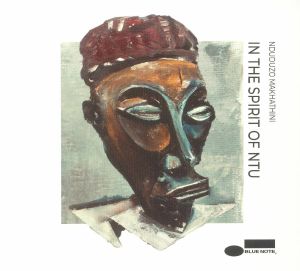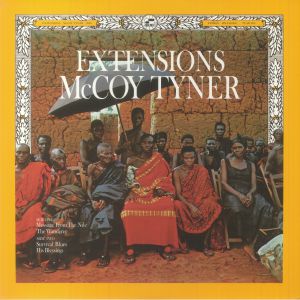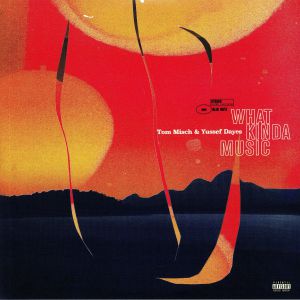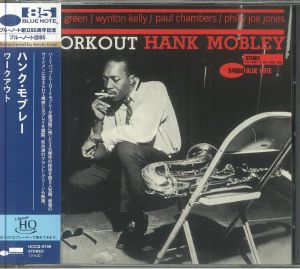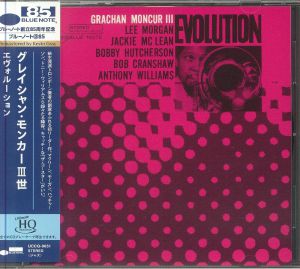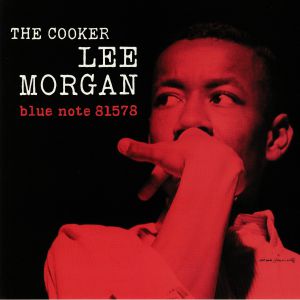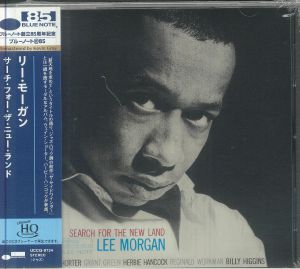Back catalogue: All genres
Juno's full catalogue of All genres
Albums
Review: Thad Jones' The Magnificent Thad Jones is a stunning album that beautifully showcases the beauty of hard bop. Released in 1956, it reflects the era's evolving jazz landscape, influenced by modern jazz pioneers like Horace Silver and Miles Davis. The album's tracks, including original compositions like 'Billy-Boo' and 'Thedia,' exude a relaxed yet lively vibe, typical of hard bop. Jones' trumpet work shines throughout, displaying a remarkable blend of relaxation and intensity in his solos. The ensemble's chemistry, especially between Detroit-raised musicians like pianist Barry Harris and Jones, is palpable, supported by the solid foundation laid by Percy Heath and Max Roach. Rudy Van Gelder's recording in Hackensack, New Jersey, harnasses the warmth and depth of Jones' trumpet sound, adding to the album's allure. The Magnificent Thad Jones is a timeless gem that continues to enchant jazz enthusiasts with its impeccable execution and rich musicality.
… Read morePlayed by: Juno Recommends Jazz
in stock ₺1.275,35
Cliff Jordan (Tone Poet Series) (gatefold 180 gram audiophile vinyl LP)
Cat: 488194 7. Rel: 31 Oct 24
Jazz
Review: Underappreciated tenorman Clifford Jordan made a notable entry from Chicago with three exceptional Blue Note sessions in 1957, including the self-titled album reissued here which features a stellar septet with Lee Morgan on trumpet, Curtis Fuller on trombone, John Jenkins on alto, Ray Bryant on piano, Paul Chambers on bass, and Art Taylor on drums. This mono Tone Poet Vinyl Edition, produced by Joe Harley, is mastered by Kevin Gray from the original analogue master tapes so sounds superb and is a great way to dive into Jordan's significant contribution to jazz.
… Read morePlayed by: Juno Recommends Funk, Juno Recommends Jazz
in stock ₺1.574,49
Review: Cliff Craft is a standout gem in Blue Note's 1500 series and one of the rarest treasures. This superb album features Clifford Jordan on tenor sax, alongside Art Farmer (trumpet), Sonny Clark (piano), George Tucker (bass), and Louis Hayes (drums). It's a smooth, soulful journey that captivates from the first note. The album opens with Jordan's composition 'Laconia,' setting the tone with a relaxing, immersive sound. Jordan's craftsmanship shines throughout, especially on 'Soul-Lo Blues,' a bluesy, enjoyable tune that highlights his exceptional talent. The title track, Cliff Craft, is a fast-tempo, hard-bop piece that showcases Jordan's rich tenor sound and the superb rhythm section. Side-2 kicks off with 'Confirmation,' a medium-tempo Bird tune that features laid-back solos from Jordan and Farmer. Clark's smooth, flowing solo adds to the track's charm. 'Sophisticated Lady,' a beautiful ballad by Duke Ellington, stands out as a favorite slow tune. The album concludes with the driving energy of Parker and Gillespie's 'Anthropology,' leaving you wanting more. Cliff Craft is one of the finest Blue Note records ever made.
… Read morePlayed by: Juno Recommends Jazz
in stock ₺1.275,35
One Deep River (limited 3xLP + 2xCD + inserts + guitar pick set & tin + enamel badge in slip-case)
Cat: BLUN 1440661. Rel: 23 May 24
Rock
in stock ₺7.939,53
in stock ₺543,46
Review: Guitar virtuoso Julian Lage's Speak To Me is a dynamic Blue Note album produced by Joe Henry. Arriving with 13 original tracks, Lage's compositions navigate a rich tapestry of American music genres, from gospel hymns to California singer-songwriter vibes and skronky jazz. The album's lead single '76' showcases a hard-driving blues essence, while 'As It Were' offers an atmospheric acoustic ballad. With contributions from Kris Davis, Patrick Warren, Levon Henry, and his trusted trio with bassist Jorge Roeder and drummer Dave King, Lage presents a multifaceted musical journey that captivates and enthrals in equal measure here.
… Read more in stock ₺1.696,92
in stock ₺3.482,20
Review: Charles Lloyd returns with his latest musical offering, The Sky Will Still Be There Tomorrow, a majestic double LP of new studio recordings from the legendary saxophonist. Despite this being Lloyd's eleventh album for Blue Note, it still makes for a sudden comeback, as it is the first new set of sessions to appear since 2017's twin releases, 'Vanished Garden' and 'Tone Poem'. On The Sky Will Still Be There Tomorrow, Lloyd proffers a muted, tender sound, abiding by emotive progressions backed up by homespun lower bout hits and natural piano playing. Lloyd hardly needs to lift a finger to glean the reams of emotion that swell from his instrument.
… Read more in stock ₺1.574,49
in stock ₺654,18
in stock ₺610,00
Trio Fascination: Edition One (Tone Poet Series) (gatefold 180 gram audiophile vinyl 2xLP)
Cat: 452622 0. Rel: 01 Feb 24
Jazz
Played by: Juno Recommends Jazz
in stock ₺1.939,11
Played by: AfroBase (Radio Chart)
in stock ₺398,68
in stock ₺554,64
Review: McCoy Tyner looked towards Africa on his stunning 1970 album Extensions, a far-reaching exploration of Black identity that marked the masterful pianist's fifth recording for Blue Note Records. After leaving John Coltrane's band, Tyner had moved from Impulse to Blue Note and made his enduring post-bop classic The Real McCoy in 1967. In the following years Tyner steadily expanded his musical scope: writing for a 9-piece ensemble on Tender Moments; exploring the textures of a piano-vibes led quartet with Bobby Hutcherson on Time for Tyner; and pushing at the boundaries of mainstream jazz on Expansions. Extensions is perhaps most notable for being the only recorded collaboration between Tyner and Alice Coltrane who plays harp on three of the album's four pieces (all composed by Tyner) along with Gary Bartz on alto saxophone, Wayne Shorter on soprano and tenor saxophone, Ron Carter on bass, and Elvin Jones on drums.
… Read more in stock ₺1.718,74
Played by: Juno Recommends Jazz
in stock ₺1.164,64
in stock ₺998,03
in stock ₺709,53
Demon's Dance
Toyland
Boo Ann's Grand
Sweet Love Of Mine
Floogeh
Message From Trane
in stock ₺698,89
in stock ₺753,71
in stock ₺709,53
in stock ₺709,53
Let Freedom Ring (Tone Poet Series) (gatefold 180 gram audiophile vinyl LP)
Cat: 486443 4. Rel: 05 Sep 24
Jazz
Review: Jackie McLean's Let Freedom Ring (1962) marks a pivotal moment in his career, where he boldly steps into uncharted territory, blending hard bop with avant-garde elements. The album, recorded at Van Gelder Studio, features McLean on alto sax, supported by Walter Davis Jr. on piano, Herbie Lewis on bass, and Billy Higgins on drums. The track 'Omega' stands out for its innovative approach, blending syncopated bass and piano rhythms with sharp, high-register saxophone lines. The song shifts effortlessly between tempos, showcasing the tight interplay between McLean and his band, particularly Higgins' relentless drumming and Davis' rhythmic accents. While 'Melody for Melonae' often receives attention for its emotive power, 'Omega' exemplifies McLean's forward-thinking vision, offering a spacious and harmonically rich canvas that predates many later "modern" jazz experiments. The album's overarching theme of "freedom" resonates on multiple levelsimusical, expressive, and perhaps even socialireflecting McLean's journey beyond traditional hard bop into a more liberated, dissonant sound. McLean's collaboration with Blue Note during this period produced a series of groundbreaking records, with Let Freedom Ring standing as a testament to his willingness to challenge conventions while staying rooted in the vibrant energy of jazz.
… Read morePlayed by: Juno Recommends Jazz
in stock ₺1.596,32
Review: Alto saxophonist Jackie McLean's 1960s output ran the gamut from hard bop to the avant-gard, with his 1964 post-bop dates It's Time! and Action splitting the difference. Now reissued for Blue Note's Tone Poet series, this reissue of the latter LP follows up Rudy Van Gelder's 2004 curator's edition; McLean's playing is lithe and limber here, piquing out from each mix - from the opening fan-outs of 'Plight' to the continual peacockings of 'I Hear A Rhapsody' - as if to suggest that McLean himself knows that his instrument resounds at the exact high frequency that naturally commands human attention. With the Tone Poet series primed for audiophiles, you're in for a treat.
… Read morePlayed by: Juno Recommends Jazz
in stock ₺1.763,45
Tippin' The Scales (Tone Poet Series) (gatefold 180 gram audiophile vinyl LP)
Cat: 355197 5. Rel: 05 Apr 22
Jazz
Review: American alto talent Jackie McLean released his Tippin The Scales album in 1979 on the legendary Blue Note. It was a post bob record that has rather remained under the radar in the years since, but will still cost you a pretty penny if you can find a second hand copy. The Tone Poet serve brings it back to the fore with a deluxe reissue package that allows the tunes to really shine. Jackie wrote two of them while Sonny Clark write three and one is a J. Latouche and V. Duke collaboration. The record was recorded on September 28, 1962 and is one of the more traditional records in McLean's oeuvre.
… Read morePlayed by: Juno Recommends Jazz
in stock ₺1.541,49
in stock ₺576,46
in stock ₺421,57
in stock ₺1.851,81
Review: As fast-rising underground stars in their own right, you'd expect any collaborative album from soul-fired South London singer/songwriter/beat-maker Tom Misch and prolific jazz drummer Yussef Dayes (best known for his now long-running collaboration with Kamaal Williams) to be rather good. "What Kinda Music" is, with the pair mixing and mangling elements of soul, jazz-funk, electronica and jazz, a set that defies easy categorisation. Both musicians exceed themselves throughout, with tipsy electronics, sweeping strings, bass, effects-laden guitars, woozy synth lines and Misch's heartfelt, soul-flecked vocals offering a perfect foil for Dayes' loose-limbed, headline-grabbing drumming.
… Read more in stock ₺1.042,21
A Caddy For Daddy (Blue Note Tone Poet Series) (gatefold 180 gram audiophile vinyl LP)
Cat: 389636 2. Rel: 06 Jul 23
Jazz
Review: Few jazz saxophonists were as majestic as Hank Mobley. He had a unique sound that sat in between the rawness of John Coltrane and the smoothness of Stan Getz and released a number of now-classic albums. Soul Station has already had the Tone Poet Series treatment and next up to get remastered and come on new audiophile vinyl is A Caddy For Daddy. He had already been a But Note artist for some 10 years when he recorded this one in 1965. It finds him alongside a first-class sextet with Lee Morgan on trumpet, Bob Cranshaw on bass, McCoy Tyner on piano, Billy Higgins on drums and Curtis Fuller on trombone.
… Read morePlayed by: Juno Recommends Jazz, DJ ROCCA
in stock ₺1.319,53
in stock ₺709,53
Review: By 1960, Georgia-born tenor saxophonist Mobley was at the height of his powers, crafting a trilogy of hard bop masterpiecesiSoul Station, Roll Call and Workout. Roll Call, the middle entry, finds Mobley leading an inspired quintet featuring the young and fiery Freddie Hubbard on trumpet, alongside the rock-solid Soul Station rhythm section of pianist Wynton Kelly, bassist Paul Chambers and the explosive Art Blakey on drums. The result is a hard bop stunner, bursting with energy, interplay and lyrical phrasing. This reissue opens with the dynamic title track, a minor-key powerhouse that jumps out of the speakers, pushing each musician to deliver their best. Mobley and Hubbard's chemistry is electrifying, their solos crackling with urgency. The swaggering 'My Groove Your Move' follows, built on a confident, swinging groove, while 'A Baptist Beat' channels the deep, soulful call-and-response tradition of the black church. A second take of the latter further showcases the group's enthusiasm and spontaneity. The album's only standard, 'The More I See You', is a sublime moment of restraint, with Hubbard's use of the harmon mute adding a delicate, smoky touch. Mobley's playing here epitomises his gift for melodic improvisationisubtle yet deeply expressive. His warm, bluesy tone and sophisticated phrasing made him one of the most lyrical saxophonists of his era. Even decades later, Roll Call remains a cornerstone of hard bop.
… Read morePlayed by: Juno Recommends Jazz
in stock ₺1.197,10
Soul Station (Blue Vinyl Series) (limited 180 gram blue vinyl LP with obi-strip (indie exclusive))
Cat: 651174 0. Rel: 10 Oct 24
Jazz
Review: Hank Mobley's Soul Station, recorded in 1960, stands as a defining moment in his prolific Blue Note career. By this time, Mobley had already established himself, yet this album brought his lyrical tenor saxophone playing to new heights. Accompanied by a stellar rhythm sectioniWynton Kelly on piano, Paul Chambers on bass, and Art Blakey on drumsiMobley shines as the sole horn in the quartet, allowing his smooth yet robust style to take center stage. The album opens with the breezy standard 'Remember' and swiftly moves into Mobley's original compositions like 'Dig Dis' and the title track, both drenched in bluesy, soulful grooves. Tracks like 'This I Dig of You' and 'Split Feelin's' showcase Mobley's deft ability to balance catchy melodies with intricate improvisation. Critics often underestimated his relaxed style, but Soul Station reveals the depth of his talent. All-analogue and beautifully remastered for this Blue Note Classic Vinyl Edition, Soul Station endures as a timeless hard bop masterpiece, capturing Mobley's distinctive sound at its peak.
… Read more in stock ₺1.275,35
A Slice Of The Top (Tone Poet Series) (reissue) (gatefold 180 gram audiophile vinyl LP)
Cat: 550597 8. Rel: 05 Dec 24
Jazz
Review: Hank Mobley's A Slice of the Top, recorded in 1966, is Mobley's nod to Birth of the Cool, blending hard bop with Duke Pearson's brilliant arrangements. With an expanded octet featuring unique additions like euphonium and tuba alongside a stellar lineupiJames Spaulding on alto sax, Lee Morgan on trumpet, McCoy Tyner on piano, Bob Cranshaw on bass and Billy Higgins on drumsithe album is a richly layered experience. This Tone Poet Vinyl Edition, produced by Joe Harley and mastered by Kevin Gray from original tapes, arrives on 180g vinyl in a deluxe gatefold tip-on jacket.
… Read more in stock ₺1.452,60
in stock ₺753,71
Third Season (Tone Poet Series) (gatefold 180 gram audiophile vinyl LP)
Cat: 554214 6. Rel: 13 Mar 25
Jazz
Review: Recorded in 1967, this jazz classic is a quintessential hard bop album that proves why the tenor saxophonist's signature sound was so influential. The seven-piece band includes alto saxophonist James Spaulding, trumpeter Lee Morgan, guitarist Sonny Greenwich, pianist Cedar Walton, bassist Walter Booker and drummer Billy Higgins and the ensemble's tight chemistry and individual virtuosity shine throughout the album with Mobley's smooth yet dynamic saxophone leading the way. A blend of intricate solos and rich ensemble passages, Third Season is a standout example of the era's high-calibre jazz and one that captures the spirit of the late 60s perfectly.
… Read more in stock ₺1.596,32
Review: Blue Jazz's on going Tone Poet Series - which is about reissuing classic jazz on heavyweight, audiophile quality vinyl - throws out another gem here with the Hank Mobley classic Soul Station. Hank started out as a pianist before moving to the tenor sax aged 16. He put plenty of emotion and intensity into every note he played and during the years 1955-1970 he fronted more than 25 Blue Note albums as well as being a sideman on many others. This record captures him at the peak of his powers with a lyrical playing style and length, passionate solos.
… Read morePlayed by: Juno Recommends Jazz
in stock ₺1.452,60
Review: Hank Mobley might not be so well known among the greats of saxophonic jazz, but that probably boils down to him making No Room For Squares. Indeed, only the coolest of the menthol-cool were permitted access to this album and Mobley's performances at the time of its release; this was undoubtedly a self-selecting process ensured by the garnering of some of the hottest talents of the day on band duties, including Herbie Hancock on piano, Donald Byrd on trumpet, and Butch Warren on bass. Moving like an effortless meandering current slinking downstream, the six tracks on this vinyl reissue put on effortless instrumental airs.
… Read morePlayed by: Juno Recommends Jazz
in stock ₺1.175,28
Review: Tenor saxophonist Hank Mobley's peak in the early 1960s produced a series of hard bop classics including Soul Station, Roll Call, Workout, No Room For Squares, and The Turnaround. Recorded in 1961, Workout showcased Mobley's prowess alongside guitarist Grant Green, pianist Wynton Kelly, bassist Paul Chambers and drummer Philly Joe Jones. Featuring four dynamic Mobley originals and one standard, the album inspired vigorous improvisations. This Blue Note Classic Vinyl Edition, mastered by Kevin Gray from the original tapes, presents a stereo, all-analog experience on 180g vinyl for maximum enjoyment.
… Read morePlayed by: Juno Recommends Jazz
in stock ₺1.142,28
Played by: Juno Recommends Jazz
in stock ₺1.408,42
Good Friday Blues (Tone Poet Series) (180 gram audiophile vinyl LP + insert)
Cat: 486504 9. Rel: 05 Sep 24
Jazz
Review: Recorded in the early hours of Good Friday 1960, Good Friday Blues captures the spontaneous brilliance of The Modest Jazz Trio, led by Jim Hall on guitar, Red Mitchell on piano and Red Kelly on bass. Originally intended to record a single track for a blues anthology, the session evolved into a full album as the trio's effortless chemistry and musical inspiration turned the night into a memorable session. The resulting six tracks include Mitchell's originals and interpretations of standards like 'Willow Weep For Me' and 'I Remember You.' The absence of drums highlights Hall's delicate guitar tones and Mitchell's surprising piano talents, with Kelly's bass providing a solid foundation. One of the more underrated jazz albums for the time, this reissue should help catapult it to the level of attention it deserves.
… Read morePlayed by: Juno Recommends Jazz
in stock ₺1.596,32
in stock ₺664,82
Genius Of Modern Music Volume One (Classic Vinyl Series) (180 gram audiophile vinyl LP)
Cat: 453533 6. Rel: 15 Dec 22
Jazz
Review: The mighty Thelonious Monk - already rightly hailed as a Genius of Modern Music as far back as 1951. It might be easy to take for granted his groundbreaking playing in light of the whole jazz culture that has come along since, but he was truly out in front, creating a sound never heard before. As Blue Note celebrates its 75th anniversary, they're revisiting this landmark collection of Monk's earliest works as a bandleader for Blue Note, remastered from hi-res transfers of the original master tapes. This is the best you'll ever have heard these recordings, make no mistake.
… Read more in stock ₺1.053,39
in stock ₺1.596,32
Played by: Juno Recommends Jazz
in stock ₺831,96
Played by: Juno Recommends Jazz, Originals
in stock ₺1.585,67
Played by: Juno Recommends Jazz
in stock ₺886,78
Cornbread (Tone Poet Series) (gatefold 180 gram audiophile vinyl LP)
Cat: 775005 1. Rel: 21 Jun 19
Jazz
Played by: Juno Recommends Jazz
in stock ₺1.585,67
in stock ₺698,89
in stock ₺753,71
in stock ₺709,53

 TRY
TRY

















